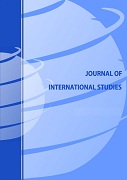ENABLERS OF HYBRID WARFARE: THE BULGARIAN CASE
ENABLERS OF HYBRID WARFARE: THE BULGARIAN CASE
Author(s): Boyan HadzhievSubject(s): International relations/trade, Security and defense, Peace and Conflict Studies
Published by: Fundacja Centrum Badań Socjologicznych
Keywords: hybrid warfare; national security; Bulgaria; Russia;
Summary/Abstract: Russian actions in the Crimea since 2014 have increased Central and Eastern European countries concerns and strengthened their fears of becoming the next target of hybrid attacks. The common understanding of hybrid war as such is usually related to the ambiguous boundaries between peace and war. But this view is more about the reluctance of political leaders to recognize that hybrid warfare in its essence is a war with limited political aims carried out using a variety of military and non-military means. As in any war, the strategy of this warfare aims to foster the sense of insecurity and uncertainty in the opponent. Disinformation, subversion, demoralization and division in society, political corruption, provocations and threats are some of the key tools that are being applied with different success in the hybrid warfare. The paper presents a theoretical model consisting of three groups of factors (socio-historical, governmental and international) that create an appropriate environment for conducting a hybrid warfare. Taken together, these prerequisites allow the assessment of the degree of vulnerability to hybrid threats. In Bulgaria, the ongoing debate about Russia's role is developing in the context of the alleged hybrid war that Moscow is conducting in the country. The presented model is applied to the case of Bulgaria in order to show the practical potential of Russian hybrid aggression in this country.
Journal: Journal of International Studies
- Issue Year: 13/2020
- Issue No: 1
- Page Range: 28-43
- Page Count: 16
- Language: English

